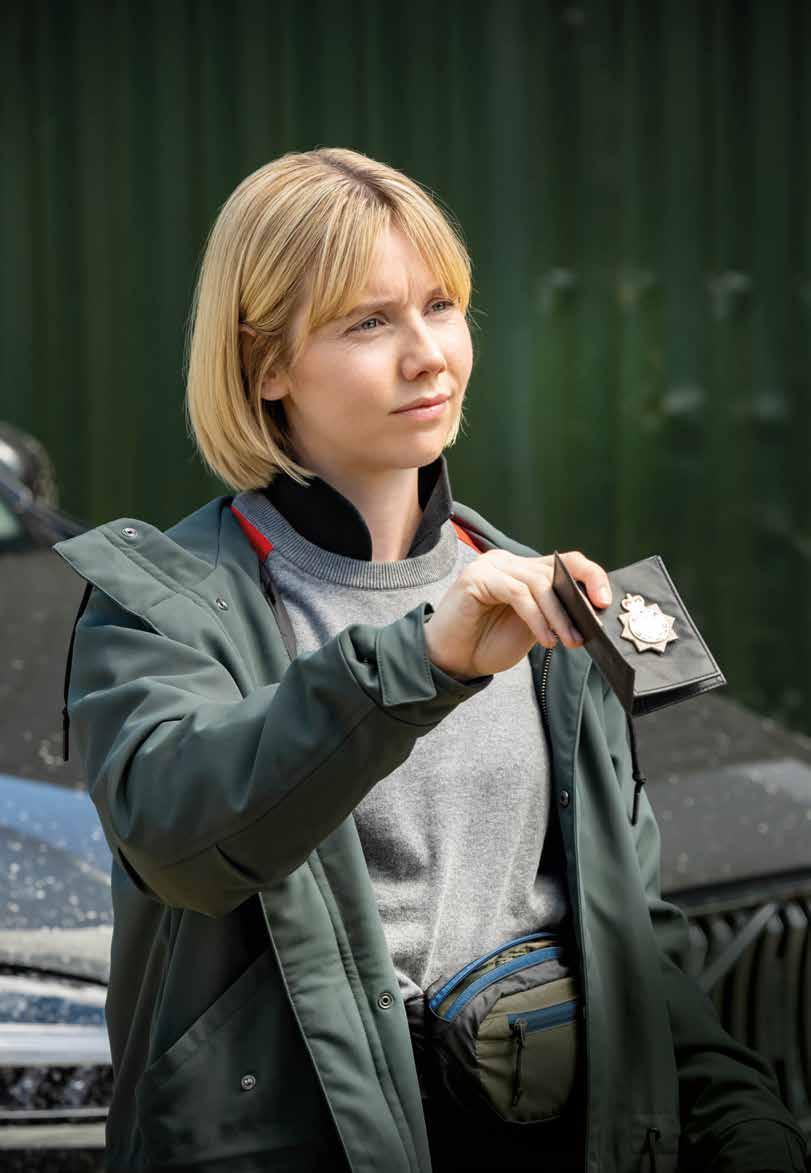
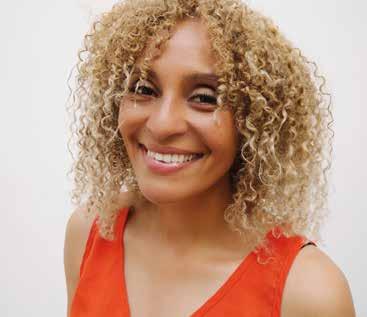

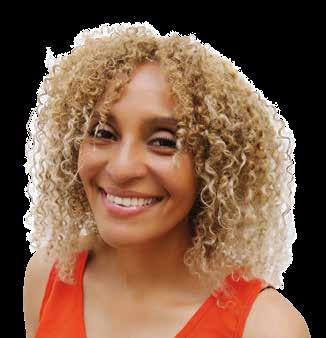
DS Karen Pirie investigates a crime from the past in ITV drama
need to celebrate
WAR CRY 1 October 2022 50p Runners make marathon effort in London
‘We
differences’ On the case
What is The Salvation Army?
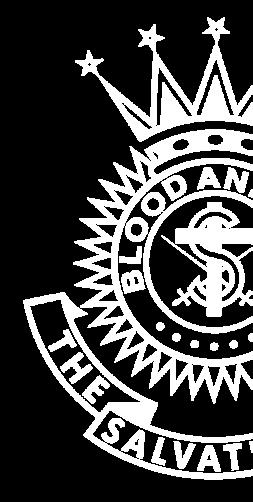
The Salvation Army is a Christian church and registered charity seeking to share the good news of Jesus and nurture committed followers of him. We also serve people without discrimination, care for creation and seek justice and reconciliation. We offer practical support and services in more than 700 centres throughout the UK. Go to salvationarmy.org.uk/find-a-church to find your nearest centre.
What is the War Cry?
The Salvation Army first published a newspaper called the War Cry in London in December 1879, and we have continued to appear every week since then. Our name refers to our battle for people’s hearts and souls as we promote the positive impact of the Christian faith and The Salvation Army’s fight for greater social justice.
WAR CRY
Issue No 7596
Editor: Andrew Stone, Major
Deputy Editor: Philip Halcrow
Production Editor: Ivan Radford
Assistant Editor: Sarah Olowofoyeku

Staff Writer: Emily Bright
Staff Writer: Claire Brine
Editorial Assistant: Linda McTurk
Graphic Designer: Rodney Kingston
Graphic Designer: Mark Knight
Email: warcry@salvationarmy.org.uk

The Salvation Army
United Kingdom and Ireland Territory
101 Newington Causeway
London SE1 6BN
Tel: 0845 634 0101

Subscriptions: 01933 445445 (option 1, option 1) or email: subscriptions@satcol.org
Founder: William Booth
General: Brian Peddle
Territorial Commander: Commissioner Anthony Cotterill
Editor-in-Chief: Major Mal Davies
Published weekly by The Salvation Army
© The Salvation Army United Kingdom and Ireland Territory ISSN 0043-0226
The Salvation Army Trust is a registered charity. The charity number in England, Wales and Northern Ireland is 214779, in Scotland SC009359 and in the Republic of Ireland CHY6399.

Printed by CKN Print, Northampton, on sustainably sourced paper
From the editor’s desk
AS we enter into the autumnal month of October, the hot, sunny days of summer can become a distant memory. But this summer was one to remember, because temperatures rose to all-time highs in many parts of the UK and disrupted everyday life. It was a stark reminder of the way global warming is having a direct effect on us in this country.
But climate change is impacting every area of the world, and for some the changes are far more severe. Two weeks ago the War Cry reported on monsoon flooding in Pakistan that killed more than 1,000 people and destroyed a million homes. We told how The Salvation Army was helping hundreds of families in the country with food packages and hygiene kits.
In this week’s issue, we talk to climate activist Laura Young, who explains that these floods are a consequence of climate change.
‘The link is clear between human actions in western countries – emitting too much carbon dioxide and pollution – and climate change damage,’ she says. ‘It’s an injustice because the people who are impacted are not the people who are causing it.’
Convinced that this injustice should be corrected, Laura worked for the international development charity Tearfund. She has also given talks in schools and worked with businesses on their sustainability campaigns. She is motivated in her work by her Christian faith.

‘God calls us to love our neighbour. I can love my neighbour by praying for them or by supporting them financially through charity initiatives,’ she tells us. ‘But if my neighbour is being impacted by my lifestyle or my country’s infrastructure, I also need to campaign to change that.’
As we read Laura’s interview, perhaps we will be encouraged to consider our actions and the consequences they have on people around the globe. Whatever our religious beliefs or ethical outlook may be, it is hard to disagree that the effects of climate change are not fair and need to be properly – and swiftly – addressed.
INFO INFO 2 • WAR CRY • 1 October 2022
Whenyou’veread the WarCry , whynot PASS IT ON f Front-page picture: ITV 15 6 Your local Salvation Army centre FEATURES 3 Looking back Detective investigates historical crime in ITV drama 5 Long running event The London Marathon returns 6 ‘Kids notice difference from an early age’ Why talking to children about race is important 9 A climate for change Great Big Green Week raises awareness of global warming REGULARS 4 War Cry World 12 Team Talk 13 Now, There’s a Thought! 14 Puzzles 15 War Cry Kitchen CONTENTS 9
Cold case, but the heat is on
DS Karen Pirie investigates an unsolved mystery in ITV drama
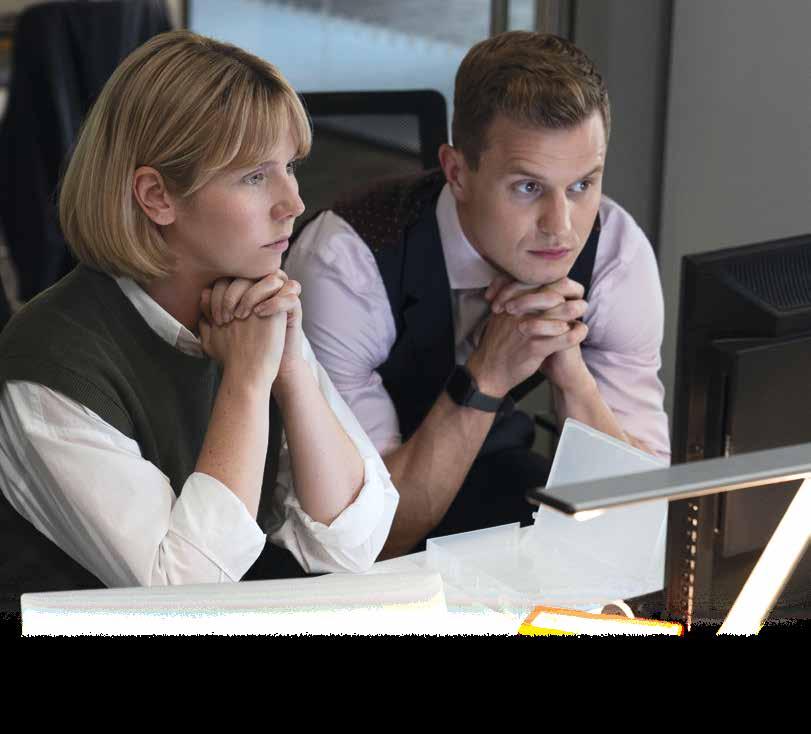 TV feature by Emily Bright
TV feature by Emily Bright
WHEN a true crime podcaster focuses on an unsolved murder from 25 years ago, it presents a PR nightmare for the police in ITV’s new detective series Karen Pirie, based on a novel by Val McDermid.
As the opening episode revealed last Sunday (25 September), the murder happened in June 1996. Football fans in a pub in St Andrews had been watching Euro 96, but student housemates Alex Gilbey (Buom Tihngang), Tom ‘Weird’ Mackie (Jack Hesketh) and Sigmund ‘Ziggy’ Malkiewicz (Jhon Lumsden) were more interested in 19-year-old barmaid Rosie Duff (Anna Russell-Martin). Ziggy invited her to a party being held at an abandoned mansion and just after midnight, she sneaked away to join them.
Some time later, Ziggy ran into a police constable’s car, with blood on his shirt and hands, pleading with her to call an ambulance. She followed him to the ruins of St Andrews Cathedral, where Ziggy’s two friends were waiting by Rosie’s dead body. The young men at the scene
were arrested as the main suspects. Yet, because of insufficient forensic evidence, they were released without charge.
Twenty-five years on, and the podcast has stirred up renewed interest in the crime. Detective Sergeant Karen Pirie (Lauren Lyle) is called on to reopen the investigation. As she re-examines the case, she is left wondering who is really telling the truth.
Rosie had lied to her family, and the defendants suspiciously denied having any previous association with the barmaid. To top it all off, DS Pirie is under pressure from her superiors not to pursue a lead of a personal nature.
Elsewhere, Alex (Ariyon Bakare) is now an artist living off the grid, Ziggy (Alec Newman) has become a workaholic surgeon and Weird (Michael Schaeffer) is a university history lecturer. They’ve done their best to move on with their lives. But DS Pirie’s interrogations of the trio, as well as the social media storm generated by
the podcast, threaten to undermine their carefully cultivated stories.
In Karen Pirie it can be difficult to know who to trust. Characters have their own agendas and may not always be truthful or act with integrity. The same can be true in our own lives: friends and family may upset, deceive or betray us through their actions or words, and we can be left wondering who we can put our faith in.
There is someone, though, who will never let us down: God. He is faithful, true and endlessly good to us, with a motive of unconditional love.
One Bible writer explains: ‘This God –his way is perfect; the word of the Lord proves true; he is a shield for all those who take refuge in him’ (2 Samuel 22:31 English Standard Version).
We can examine the evidence of those claims for ourselves by reading the Bible and asking God to reveal himself to us. The story we’ll uncover is more extraordinary than anything we could have suspected.
DS Karen Pirie (Lauren Lyle) teams up with DC Jason Murray (Chris Jenks) to investigate an unsolved murder
It can be difficult to know who to trust
1 October 2022 • WAR CRY • 3
ITV
WtwxcxzWt

Christianity provides ‘anchor’ for defender of faith
CRYSTAL Palace footballer Joel Ward told The Sunday Times that his Christian faith has acted as his ‘moral compass’ and ‘anchor’ during his career.


The defender’s parents, Phil and Kim, were part of the leadership team of a Bible college in Emsworth, Hampshire, and he regularly attended church and Christian youth groups when he was growing up.
Joel said that ‘the sole message of the Church’ is ‘the grace and gift of God’, and that the message plays a central role in his life.
‘Faith has given me a moral compass,’ he said. ‘It has given me an anchor besides my family and my circle – an anchor to hold on to, somewhere where I can get away. I can cast my burden and just talk and have support, just having that community. It’s been a constant throughout my life and kept me steady and consistent.’
Historic manuscript in North East
THE Lindisfarne Gospels – an historic manuscript collecting the four biblical books that tell the story of Jesus – has returned to the northeast of England for an exhibition.
The illuminated book, which is believed to have been created by a monk, Eadfrith, on Holy Island around AD700, is usually held at the British Library in London but is being displayed at the Laing Art Gallery in Newcastle until 3 December.

As well as the book itself, which is open at one of its richly decorated ‘carpet pages’, the exhibition contains other illuminated manuscripts, religious objects from the eighth century and a new film by Turner prizewinning artist Jeremy Deller exploring the journey of the Lindisfarne Gospels back to the North East.
The exhibition aims to explore the meaning of the Lindisfarne Gospels and its relationship with themes of personal, regional and national identity.
Calling the book ‘one of the greatest manuscripts in our care’, Dr Xerxes Mazda, head of collections at the British Library, says: ‘We look forward to seeing new audiences engage with this exceptional example of early medieval design.’
Century of service celebrated in Zambia
THE Salvation Army has celebrated 100 years of its work in Zambia and 50 years of its work in Spain and Portugal.
General Brian and Commissioner Rosalie Peddle, international leaders of the church and charity, attended celebrations in Lusaka and Lisbon.
In Lisbon, they met with Salvationists from Spain and Portugal, as well as city officials.
In Zambia, the couple were shown round Salvation Army facilities, including a newly constructed health clinic.
The country’s president, Hakainde Hichilema, attended the final Sunday morning meeting of celebrations, accompanied by the First Lady, Mutinta Hichilema. He said: ‘One hundred years of service to the community is not a mean achievement! I commend The Salvation Army for being dedicated to God’s work.’
He particularly thanked The Salvation Army for its health services and for the way it responded to severe floods in 2020.
The Lindisfarne Gospels
t 4 • WAR CRY • 1 October 2022
WAR CRY
SEBASTIAN FREJ/ALAMY COLIN DAVISON
8 out of 10 consider themselves spiritual

RESEARCH has revealed that faith is a ‘core element of personal identity’ globally.
A survey, which was commissioned by the Faith and Media Initiative and carried out in 18 countries across North America, Europe, South America, Asia, Africa and the Middle East, looked at the portrayal of faith and religion in the media. It showed that there is a strong demand for media coverage of the topic.
More than 60 per cent of respondents felt that high-quality content on faith and religion was needed in their respective countries, and more than 50 per cent said that media coverage actively ignores religion as an aspect of society and culture.
Dritan Nesho, CEO of HarrisX, the global market research company that produced the findings, said: ‘The data reveals that faith and religion are a core element of personal identity globally, with 82 per cent of respondents viewing themselves as faithful, religious or spiritual.’

Do you have a story to share?
Miles and smiles
Runners take on the London Marathon Feature by Claire Brine
SWEAT, tears and exhaustion could well be on the horizon for runners taking part in the London Marathon tomorrow (Sunday 2 October). After months of gruelling training over a scorchingly hot summer, participants are preparing to hit the road and embark on their final 26.2 miles. Whether they feel ready or not, the finish line is closer than ever.
One runner who can’t wait to start pounding the capital’s pavements is my brother, Marc Brine, a forest school practitioner from Preston. Marc has been keen to run the London Marathon ever since our dad, mum and I completed it in previous years.
‘It’s always been on my radar as something I’ve wanted to do,’ he says. ‘And I love running with other people, so I’m excited to be part of one of the biggest races in the world.’
FAITH groups are taking part in climate change vigils and rallies across the UK to pressurise corporate polluters into paying for the loss and damage caused by global warming.
Events that took place last week included a walk of witness from St John’s Church in Waterloo to Parliament Square.
The vigils and rallies were co-ordinated by the Faith for the Climate network. The organisation, which represents all faiths, aims to highlight how the communities who bear the brunt of climate change damage contribute the least carbon emissions.
Faith for the Climate director Shanon Shah said: ‘People are suffering deeply from the impacts of climate change right now. Those most impacted are the ones least responsible. As people of faith, we see this as a deep moral injustice.’
As well as running hundreds of miles in training, Marc has been using the months leading up to the marathon to raise sponsorship for a Salvation Army refugee resettlement project in Preston. On race day, when his legs begin to ache, he hopes that focusing on the cause will give him the strength to keep going.

‘A mantra that I’ve used in tough runs in the past is “smile every mile”,’ he says. ‘Because if you aren’t enjoying it, what’s the point?’
Finding the joy in difficult, sometimes agonising, situations is no easy feat. But it is possible. Many marathon-finishers go on to describe the experience as the best day of their life – despite the pain they endured to get there.
Running aside, when we consider the journey of our own life, we all know how it feels to have good days and bad days. We know there could be both laughter and tears ahead.
When the going gets tough, the Bible encourages us to keep going – by focusing on God, who is a source of joy. One of its writers says: ‘Rejoice in the Lord always. I will say it again: rejoice!’ (Philippians 4:4 New International Version).
Whatever our circumstances, God’s love for us has the power to fill us with strength, courage and hope as we face the future. If we turn to him, we can experience deep joy every step of the way.
Marc in training
We know there could be laughter and tears ahead
tWwxcx 1 October 2022 • WAR CRY • 5
n
TheWarCryUK @TheWarCryUK warcry@salvationarmy.org.uka
salvationarmy.org.uk/warcryB
The children are
Interview by Sarah Olowofoyeku
THE summer of 2020 was tough on everybody. But it was particularly challenging for black people and people with mixed heritage, because of the increase in social awareness of racism, after the killing in the US of George Floyd – an event which reverberated across the globe.

Loretta Andrews is mixed race, having one black parent and one white, and she describes that summer as ‘pretty wild’. However, out of it came something that she hopes will bring about change.
‘I had loads of interesting conversations with my white friends,’ she says. ‘Some were difficult and didn’t go well, but I had some good ones. One of them was with my friend Ruth Hill, who I’d met when we
were both pregnant. We had set up an online platform called More than a Mum to support women, because you feel like you lose your identity a bit when becoming a mum. We had said we would write a book back then, but our kids are now 13!’
But after their recent conversation and the intervention of a publisher friend, they had the idea to collaborate on writing a book for parents to bring up the subject of race with their children. They’d call it Talking to Children about Race
conversations over Zoom and exchanged thoughts over voice notes. They mostly wrote their own chapters but worked together on a few. One of their priorities was to write a book that was non-judgemental.
Kids notice difference from a very young age
With Ruth living in Wiltshire and Loretta in London, the pair had a lot of
‘We wanted the tone of the book to be like a good friend putting their arm around you and guiding you, rather than saying what was rubbish,’ says Loretta. ‘Because shame and guilt just stops people in their tracks, it doesn’t do anyone any good. Also, what we hear over and over again is people saying that they want to have these conversations but they don’t know how and they are worried about getting it wrong. We wanted to make people feel like it’s better to get it wrong than not try at all.’
While some may say that talking to children about race is inappropriate, Loretta disagrees. She says that racism can start from an early age. Children are exposed to the news and they may overhear what adults say, so having direct conversations means they are well informed instead.
Loretta argues that talking about race does not create racism.
‘Kids notice difference from a very young age,’ she says, ‘it’s just that they don’t attach anything negative to it. It’s only turned negative when adults and society around them attaches meaning and they pick
While Black History Month is a time to celebrate the past contributions and stories of black people, it is also a time to learn how to value black people all year round. LORETTA ANDREWS, co-author of a book about how to raise ‘antiracist kids’, explains why such conversations are critical, even with young people, and how they can help make the world a better place in years to come
6 • WAR CRY • 1 October 2022
up on that. That’s why it’s so important for it to be addressed early. If we can get in there young enough to guide them away from the reactions they see others having – a security guard following a black person around the shop, for example – then their whole trajectory could be different.’
The book seeks to help the conversation by covering a range of topics, such as white privilege and being antiracist.

Loretta and Ruth use simple language so that parents can feel informed and concepts can be conveyed to children clearly.
Another topic in their book is colour-blindness, which, Loretta says, ‘a whole generation thought was a good thing’.
‘People would say we should teach children to be colourblind and that we don’t see colour. But we need to see and celebrate different colours and different races. We don’t want people not to see difference, we don’t want them to attach a negative meaning to it. By not being colourblind, you are saying that you see all of who somebody is – you the future
Loretta Andrews
Turn to page 8 f 1 October 2022 • WAR CRY • 7 CAT COUTURE/AMOROSO FILMS
From page 7
see their culture, their race and their background and you see that it’s great.’
While Loretta wrote a lot about certain principles based on theory, she also had to draw on personal experiences to write the book, which she says was traumatic. In day-to-day life, there are often instances that she just has to let go of, because ‘you can’t make an issue of it every time’.
‘Writing the book made me more aware of how many instances there have been,’ she says. ‘I had to consciously look at the points in my childhood where I’d minimised what had happened, because people often say, “You’ve got a chip on your shoulder” or, “You’re making everything about race”.
I thought about specific incidents that were without a doubt racist, but it brought up other experiences that I realised were racist as well. It was quite disturbing. Yet I’ve been lucky compared to my friends who are dark-skinned. I have light-skin privilege, so I’ve had even fewer experiences than they’ve had.
in recent years and signifies a different mindset from simply not being racist. She says that it is the difference between being passive and being active.
We highlight normalising black joy
‘Racism is alive and kicking here in the UK, and it’s wrong, and in the book we highlight it. But we also highlight normalising black joy and black experiences. So we don’t want people to just get their kids books on diversity and how to not be racist; we also want them to get a book on rainbows that has a little black girl as the main character.’

Such actions are part of what Loretta describes as ‘being antiracist’, an expression that has gained popularity
‘There are a lot of lovely people who genuinely are not racist. If they saw someone calling someone else names because of their race, they would be outraged and say that it was awful and that they would never do that. That’s one thing and that’s great, but what would it mean to not just say you would never do that, but to go over to the perpetrator and tell them what they’re doing is not OK? Or to check in with victim, and see if they are OK? Or instead of just rolling your eyes when a family member says something racist, speaking up and saying that it’s inappropriate?’
While the advice in the book is not explicitly religious and co-author Ruth doesn’t identify as a Christian, Loretta’s passion to tackle the injustice of racism stems from her Christian faith.

‘What Jesus modelled to us most was fighting for the oppressed and the underdog,’ she says. ‘So I don’t think you can be a Christian and not be against racism, homophobia, poverty or any
injustice. I don’t think I could be living out my faith properly if I wasn’t fighting any kind
‘I struggle with people who have politicised the word “antiracist”. I’m not talking about politics; I’m talking about people being held back and oppressed because of their race. Making it political forgets the person, and it derails the conversation.
‘When I feel anger about such things, I feel like I’m tapping into Jesus turning over tables at the Temple when he was angry at the unfair way people were behaving there. I think it pains God’s heart to see injustice and to see people forgetting to fight for the person.’
Because she cares about people, Loretta wants to keep the conversation about racism going.
‘The conversation didn’t just happen in 2020 and now it’s over,’ she says. ‘We’ve got a long way to go with discussing racism but kids are great at it, and we can learn from them. We will get it wrong, but we don’t need to stay in a place of guilt and shame. Instead we need to keep working and keep moving forward. And in future generations, it would be amazing to see racism become a non-issue.’
l Talking to Children about Race is published by SPCK
Ruth and Loretta
8 • WAR CRY • 1 October 2022
‘Climate change is a systemic social injustice’
‘C
OP26 coming to Glasgow, my home city, was one of the biggest moments in my career,’ says climate activist Laura Young when she thinks back to last year’s climate change conference. ‘It was fantastic to be there while I was working for Tearfund, because the charity played a huge part in my becoming an activist.
‘The high point was meeting Nicola Sturgeon and five other representatives of countries that had been paired up with our organisation. It was amazing to have that time to discuss important issues.’
Laura’s interest in campaigning against climate change was kindled while studying geography and environmental science at Dundee University. As she learnt in more detail how human exploitation of resources was causing climate change and having a lasting impact on people around the globe, she decided to adopt a more sustainable lifestyle.

‘When I was in my final year of uni, I took on a new year’s resolution to try to be more sustainable,’ she says. ‘That was 2018, when we’d seen Blue Planet II on TV, and awareness around plastic pollution and climate change was heightened. As I tried to live a more sustainable lifestyle, I realised there was so much more I could do, so I got involved in campaigning.’
In 2019, international development charity Tearfund ran a huge campaign about plastic pollution. ‘That was the first time I’d ever heard a Christian organisation talk about environmental issues,’ says Laura.
It dawned on Laura that faith and campaigning against climate change go hand in hand.
‘My passion for the environment didn’t initially come from my faith,’ she says, ‘but in the last few years, I’ve realised that caring for the planet is an
To mark the Great Big Green Week, a nationwide celebration of action on climate change, activist LAURA YOUNG recalls her experiences of Cop26 and reveals why she cares so deeply about tackling climate change
Interview by Emily Bright
Laura Young
ELAINE LIV Turn to page 10 f 1 October 2022 • WAR CRY • 9
From page 9
integral part of what we need to be doing as Christians. My faith is now the driver of everything that I’m doing.’
Since graduating, Laura has worked for Tearfund in a series of campaigning jobs, delivered a TEDx Talk on ending plastic pollution and appeared regularly on BBC radio networks and The Daily Climate Show on Sky News. She gives talks in schools and generates discussions in businesses about sustainability. This month she begins pursuing a PhD in climate science, and hopes that her research will influence climate policy.
For Laura, climate change – the focus of the nationwide Great Big Green Week campaign, which ends tomorrow (Sunday 2 October) – is a pressing issue of social justice. She explains why.
‘The link is clear between human actions in western countries – emitting too much carbon dioxide and pollution –and climate change damage, such as the recent floods in Pakistan. It’s an injustice because the people who are impacted are
not the people who are causing it.
‘A Tearfund report found that there are numerous African countries who are now spending more money on climate adaptation than on their own healthcare systems. The continent of Africa only contributes about 4 per cent of global emissions.’
Tearfund’s Dying to Adapt report, published in August, predicts that climate change adaptation costs may spiral upwards further to five times what subSaharan African countries spend on their national healthcare.
Laura says: ‘When you start seeing these numbers, you just think it’s not fair. That’s why we should be calling for better investment and reparations. It’s not only about our individual actions and trying to be more sustainable; it’s this systemic injustice too.’
She sees tackling social injustice as a central theme of the Christian faith.
‘God calls us to love our neighbour,’ she says. ‘I can love my neighbour by

praying for them or by supporting them financially through charity initiatives. I can love them when I see them suffering on the street by talking to them and caring for them. But if my neighbour is being impacted by my lifestyle or my country’s infrastructure, I also need to campaign to change that.’
As a sustainability influencer, Laura highlights the key battlegrounds in tackling climate change in our everyday lives.

‘The food that’s worst for the planet is the food we waste,’ she explains. ‘And we waste a third of our food in the UK. If food waste were a country, it would be the third biggest emitter of carbon. When food goes to landfill, it breaks down and releases methane, which is 16 times worse than carbon dioxide as a contributor to climate change. Combatting food waste is one of the most effective things we can do.’
There are a few simple things anyone can do, she says.
African countries spend more money on climate adaptation than healthcare
Laura delivers a TEDx Talk on plastic waste
TEDX GLASGOW
10 • WAR CRY • 1 October 2022
‘Think about meal planning and prepping. Don’t overbuy ingredients. Use your intuition and think: “Does the majority of my shop come from outside the UK? Can I find more UK-based food?” Plantbased foods are also more sustainable. It might be a case of reducing your meat intake by one meal per week. If you’re buying animal products, buy them locally where you can.’
Another significant contributor to climate change is fast fashion. Laura explains that overconsumption is the main problem.
‘Packaging, the dyes and the material all contribute to how sustainable something is or isn’t. But the most unsustainable thing is the sheer amount that we produce.
‘We buy five times more fashion than we did in the 1980s. Brands will not be sustainable unless they start reducing how much they are making, even if they claim to have a new eco-friendly range of clothes. At the moment, there are no advertising standards on sustainability and there’s no regulation on having to prove the claims companies make.’
Laura offers a few tips on reducing fashion carbon footprints.

‘Ultimately we need to stop buying things, or we need to get the things we want in a slightly different way, through charity shops and second-hand clothing apps,’ says Laura.

‘Often you wear a dress or suit once for
a special occasion, then it sits in your wardrobe. There are now renting platforms, which are good for things like weddings, graduations and other fancy occasions, where you can pay a fraction of the price and then give it back.
‘There are also platforms for renting kids wear. I read a stat which said that in the first year of your life, you grow 10 sizes. Young parents can rent a bundle of clothes for a couple of months. By that time, their child may have outgrown the items, and they can give them back.’
Whether she is embarking on climate research or influencing people to live more sustainably, Laura is encouraged in her work by references in the Bible to the environment and social justice.
‘In Genesis, the first book of the Bible, we were told to look after the planet,’ she says. ‘If you look around, you can see that we aren’t doing that. Jesus taught us
to speak up against issues of injustice. My faith drives my work from a sense of responsibility, and from a love of God and his creation.’
She says that in her life, Jesus is ‘a point of reference to come back to’.
‘I look at the Bible and see how he navigated situations. If I can’t figure it out from the Bible, I pray about it and ask for divine inspiration.’
While the scale of the climate change challenge may sometimes seem overwhelming, Laura trusts that God will provide her with the energy and resources she needs to continue campaigning.
‘My activism is hopeful, because I’m not doing it in my own strength,’ she says, ‘but rather in God’s strength.’
 Laura visiting a zero-waste shop in Edinburgh (above) and (right) a charity shop in Glasgow
Laura visiting a zero-waste shop in Edinburgh (above) and (right) a charity shop in Glasgow
We buy five times more fashion than in the 1980s
1 October 2022 • WAR CRY • 11
YOUR prayers are requested for Hefin, who has just received a prison sentence.
The War Cry invites readers to send in requests for prayer, including the first names of individuals and details of their circumstances, for publication. Send your Prayerlink requests to warcry@salvationarmy.org.uk or to War Cry, 101 Newington Causeway, London SE1 6BN. Mark your correspondence ‘Confidential’.

jThere is no set formula to becoming a Christian, but many people have found saying this prayer to be a helpful first step to a relationship with God Becoming a Christian
Lord Jesus Christ, I am truly sorry for the things I have done wrong in my life. Please forgive me. I now turn from everything that I know is wrong.
Thank you that you died on the cross for me so that I could be forgiven and set free.
Thank you that you offer me forgiveness and the gift of your Holy Spirit. Please come into my life by your Holy Spirit to be with me for ever.
Thank you, Lord Jesus. Amen
Team talk ’
‘
T E A M TALK Pray tell
talk
Claire Brine gives her take on a story catching the attention of War Cry reporters
SINCE the death of the Queen, I’ve been thinking about faith a lot. It started the day after she died, when I watched mourners gathering in St Paul’s Cathedral for a service of prayer and reflection. The building was full of people of all ages who wanted to remember their monarch and connect with God.
Spotting the younger faces in the congregation, I found myself reflecting on a Church of England survey, which was reported in The Guardian last month. It revealed that younger adults are more likely to pray than members of older generations, with 32 per cent of 18 to 34-year-olds saying that they have prayed to God in the past month. (By comparison, 25 per cent of people aged 55 and over said they had prayed during the same period.)
The Rev Dr Stephen Hance, national lead for evangelism and witness for the Church of England, commented that the figures challenged the ‘all-too-common assumption that young people are not interested in faith or spiritual things’.

I say things I might not tell anyone else
Having prayed through my teens and twenties and now into my thirties, I’m not surprised to learn that young adults are turning to prayer to help them through life. Talking to God is often what I do when I don’t know where else to turn. I can think things in my head, or say things out loud, that I might not tell anyone else. I can pray any time, anywhere.
I find prayer to be powerful, peaceful and helpful. But there are also times when I find it dull and difficult, and wonder what difference it makes. It can be tempting to give up praying when it feels as if God isn’t hearing me or answering in the way I think he should. In such cases, I’ve asked myself: What is the purpose of praying anyway?
The philosopher Søren Kierkegaard offered one answer: ‘The function of prayer is not to influence God, but rather to change the nature of the one who prays.’

He was right. Getting what I want isn’t – or shouldn’t be – the point of prayer. The point is that talking to God enables me to grow closer to him. And the more I begin to see the world through his eyes, the more I’m open to becoming a better me.
To receive basic reading about Christianity and information about The Salvation Army, complete this coupon and send it to
Name a
War Cry 101 Newington Causeway London SE1 6BN
Looking for help?
Address
Or email your details and request to warcry@salvationarmy.org.uk
 Extract from Why Jesus? by Nicky Gumbel published by Alpha International, 2011. Used by kind permission of Alpha International
Extract from Why Jesus? by Nicky Gumbel published by Alpha International, 2011. Used by kind permission of Alpha International
Prayerlink
12 • WAR CRY • 1 October 2022
"
Who had a UK hit with the theme song of the original Ghostbusters film in 1984?
In which city is the world’s tallest building, the Burj Khalifa?
Which East African country’s national flag comprises four horizontal bands of red, blue, yellow and green?
At sea level, what is the boiling point of water in celsius?

Who wrote the novel Tess of the d’Urbervilles?
In which decade is the TV series Stranger Things set?
by Jim Burns
It’s handy to have good connections
I

’VE had my hands full over the past few days thinking about hands. Something I had read made me begin trying to call to mind all the everyday expressions that refer to them. We talk about ‘lending a hand’, something ‘getting out of hand’ and ‘trying your hand at something’.
Soon my thoughts turned to the days two years ago when the coronavirus pandemic first became ‘the matter at hand’. Health experts urged us to wash our hands regularly, even specifying the length of time we should take to do so – 20 seconds or the time it took to sing ‘Happy Birthday’ twice. If soap and water were out of reach, we were advised to apply an alcohol-based hand sanitiser.
Still today sanitising stations remain strategically placed in workplaces, shops and entertainment venues so that we can make sure we are not unwittingly contributing to the spread of Covid-19.
Over the past couple of years, we have thought more than we used to about handshakes. Again, in the early days of the pandemic, we were urged not to shake hands. And how we missed the ability simply to touch the hand of family members and friends that we could not meet!
Perhaps we had previously taken for granted such ways of showing respect, conveying affection or providing reassurance.

If we have a human need for such signs of connection, it’s comforting to read in the Bible of how God told one group of people who were facing tough times: ‘I hold you by your right hand – I, the Lord your God. And I say to you, “Don’t be afraid. I am here to help you”’ (Isaiah 41:13 New Living Translation).
When we are trying to find the strength to deal with difficult days or are looking for reassurance that we are not facing life alone, it’s certainly worth keeping that promise of God to hand.
We have a need for signs of connection
Q A ANSWERS 1.RayParkerJr.2.Dubai.3.Mauritius. 4.100degrees.5.ThomasHardy.6.The1980s.
QUICK QUIZ 1 2 3 4 5 6 1 October 2022 • WAR CRY • 13
NOW, THERE’S A THOUGHT!

Look up, down, forwards, backwards and diagonally on the grid to find these albums of the 1980s BORN IN THE USA CAN’T SLOW DOWN COLOUR BY NUMBERS CUTS BOTH WAYS EMOTIONAL RESCUE FAITH GUILTY HOUNDS OF LOVE LABOUR OF LOVE LET’S DANCE LIKE A PRAYER MAKE IT BIG NOTHING LIKE THE SUN SUPER TROUPER TELEKON THE MIRACLE HONEYCOMB PUZZLES Fill the grid so that every column, every row and every 3x3 box contains the digits 1 to 9 8 6 5 3 2 9 4 7 1 1 4 2 7 6 5 9 8 3 9 7 3 4 8 1 5 6 2 6 5 4 9 3 2 8 1 7 3 9 1 8 4 7 2 5 6 7 2 8 1 5 6 3 4 9 5 3 9 6 7 4 1 2 8 2 1 6 5 9 8 7 3 4 4 8 7 2 1 3 6 9 5 6 5 3 7 1 6 3 4 8 5 4 2 7 9 8 7 5 7 1 3 4 7 4 2 9 4 8 3 6 9 SUDOKU WORDSEARCH L K L A K L R L T L S R H C X T M Y I T G S C X A V Q E R F W T K Z Y E K H J U Z G Q B K T E Q Z X I B Z O E E M E I K C U T S B O T H W A Y S A M H H Q L R C C D M R H Z R C F E P I Y T Z Q T Z Z A U W K M D H Q P R R X N Q O R Y Y N N T Z C M Q L C A A R I O E E J V C Y G E C Z M D Y Y C D N C X P Z O E B M E L X C T M E L V R G J U V L L R I L Z E M A F R E V O L F O S D N U O H N T K Q K Z L A B O U R O F L O V E Q E J O L X N U S E H T E K I L G N I H T O N I E U C S E R L A N O I T O M E Q B H Q Q T W Z E W S K C B D B G R P Q E O C L D V P B N W I W W K T G Z V Q S N L P A U J J G N Z K T F B L M P N C A N T S L O W D O W N X U Z B Quick 7. Appear (6) 13. Frozen water (3) 14. Headgear (3) 15. Slack (3) 16. Mat (3) 17. Disobedient (7) Each solution starts on the coloured cell and reads clockwise round the number CROSSWORD ACROSS 1. Happen again (5) 5. Money bag (5) 8. Cancel (5) 9. Tendency (5) 10. Sufficient (5) 11. Satire (5) 12. Weight-loss plan (4) 15. Sheen (6) 17. Nautical (5) 18. Rout (6) 20. Lofty (4) 25. Burial place (5) 26. Solemn promise (5) 27. Tasteless (5) 28. Twofold (5) 29. Corroded (5) 30. Roadside recess (3-2) DOWN 1. Plump (6) 2. Invent (6) 3. Wireless (5) 4. Pry (5) 5. Frolicsome (7) 6. Reiterate (6) QUICKCROSSWORD ACROSS:1.Recur.5.Purse.8.Annul.9.Trend. 10.Ample.11.Irony.12.Diet.15.Lustre.17.Naval. 18.Defeat.20.High.25.Grave.26.Troth. 27.Bland.28.Twice.29.Rusty.30.Lay-by. DOWN:1.Rotund.2.Create.3.Radio.4.Snoop. 5.Playful.6.Repeat.7.Emerge.13.Ice.14.Hat. 15.Lax.16.Rug.17.Naughty.18.Doctor.19.Famous. 21.Infamy.22.Hardly.23.Habit.24.Rebel. HONEYCOMB 1.Dilate.2.Polish.3.Go-kart. 4.Insult.5.Bumper.6.Trauma. ANSWERS 14 • WAR CRY • 1 October 2022 1. Become larger 2. Nationality of Chopin 3. Small racing car (2-4) 4. Offensive remark 5. Bar on motor vehicle 6. Deeply distressing experience 18. Medic (6) 19. Renowned (6) 21. Disgrace (6) 22. Barely (6) 23. Custom (5) 24. Insurgent (5) 865329471 142765983 973481562 654932817 391847256 728156349 539674128 216598734 487213695 294 8369
Pork sausage rolls

Ingredients
500g sausage meat
50g white onion, finely chopped

Salt and ground black pepper


1 sheet ready-rolled puff pastry

Method
Preheat the oven to 170C/325F/ Gas Mark 3.
To make the filling, place the sausage meat, white onion and some salt and pepper in a bowl and thoroughly combine. Set aside.
Lay the pastry out on a clean surface and cut in half lengthways, then cut each half into 3 to make 6 squares in
Split the filling into 6 portions and use a portion to fill the centre of each pastry slice. Fold half the pastry over the sausage meat. Brush with a little beaten egg on top and fold the other half of the pastry up to form a seal.
Place on a lined baking tray, with the fold side down. Brush with a little more beaten egg and score the tops with a knife. Bake for 30-35 minutes, until golden and risen.
Grilled cheese sandwich
Ingredients

2 slices bread

100g cheese, grated
50g butter
Method
Lay a slice of bread on a board and sprinkle over the cheese in an even layer. Top with the remaining slice of bread and press down firmly.
Melt the butter in a frying pan over a medium heat. Use a pastry brush to coat the top of the sandwich with half the melted butter from the pan. Set aside the remaining butter in a bowl.
Carefully lift the sandwich and place in the hot pan, with the buttered side down. Press down firmly with a spatula to give an even crisp to the bread and melt to the cheese. Cook for 2-3 minutes, until the underside is crisp and golden.

Generously coat the top of the sandwich with the remaining melted butter and carefully flip the sandwich over.
Press the sandwich down again and allow to cook for another 2-3 minutes, until crisp and golden. Remove from the pan and serve immediately.
SERVES 1
MAKES 6 Recipes reprinted, with permission, from the National Trust website nationaltrust.org.uk
1 October 2022 • WAR CRY • 15

James 1:5 (New Living Translation) IF YOU NEED WISDOM, ASK OUR GENEROUS GOD, AND HE WILL GIVE IT TO YOU WAR CRY



